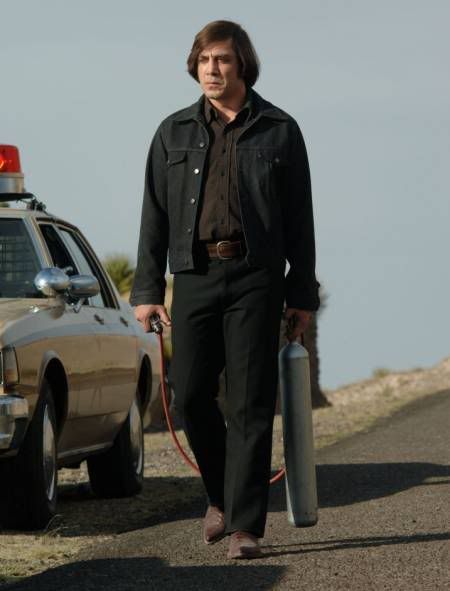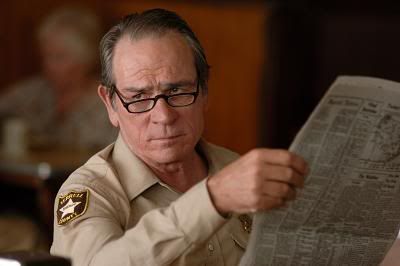Appearing at The Jaundiced Eye, the Independent Bloggers' Alliance, and My Left Wing.  And the Oscar goes to... Best Picture -- Joel and Ethan Coen Best Supporting Actor -- Javier Bardem Best Director -- Joel and Ethan Coen Best Adapted Screenplay -- Joel and Ethan Coen Claude Debussy said that "Music is the silence between the notes." Likewise, the Academy Award winning movie from the Coen brothers, "No Country for Old Men," is most brilliant for what it does not do. Spare, austere, and without musical soundtrack, "No Country for Old Men" is film-making at it's least compromising. There is no nod to Hollywood formula, audience sentimentality, or pat beliefs about good and evil. By all accounts, true its source material, the novel of the same name by Cormac McCarthy, the film takes its time telling the surprisingly satisfying story from its dark, foreboding beginning to its anti-climactic end. Unafraid of long, slow, silent takes, the Coen brothers do not pander to audiences more accustomed to breathless action and telegraphed motivations. It is a nearly inconceivable thing; an action thriller without heroes or redemption. The basic plot line, about a man running from a hit-man with a satchel of drug dealer cash, is almost incidental. Its dramatic tension arises from the complex, internal motivations of richly drawn, if stoic, characters and actors who reveal them with brilliant subtlety. In villain Anton Chigurh the Coen brothers may have brought to the screen the most perfectly realized character since Hedda Gabler. He is pure form; an archetype made celluloid from the nightmare visions of a profound imagination. He is not human. He is elemental. Like the pneumatic cattle gun he wields, he is a force of nature contained in cumbersome metal; wrath focused like a laser beam at the point of impact and leaving no trace but merciless destruction. He is not human. He is a sociopath, incapable of relating to mere mortals, cruelly weighing their lives and deaths on the flip of a coin. He is not human. He is the winds of fate made flesh. My only clear thought upon leaving the theater, "There's so much evil in the world." Not that Anton Chigurhs are common; most will never meet one. But underlying the death and destruction of "No Country for Old Men" is the inescapable awareness that life is a most uncertain of quantities and that justice is a fairy tale we tell ourselves to make sense of the senseless.  Sheriff Ed Tom Bell is a man whose life has been defined by the pursuit of justice and on whom the realization is dawning that, in that pursuit, he is "over-matched." The futility of seeking order in a chaotic universe has left him tired and vaguely mystified. With the deadpan incredulity the actor has mastered, Tommy Lee Jones recalls crimes so meaningless and devoid of humanity that he can only shake his head in wonderment. Ed Tom Bell: There was this boy I sent to the gas chamber at Huntsville here a while back. My arrest and my testimony. He killed a fourteen-year-old girl. Papers said it was a crime of passion but he told me there wasn't any passion to it. Told me that he'd been planning to kill somebody for about as long as he could remember. Said that if they turned him out he'd do it again. Said he knew he was going to hell. Be there in about fifteen minutes. I don't know what to make of that. I surely don't. The crime you see now, it's hard to even take its measure. It's not that I'm afraid of it. I always knew you had to be willing to die to even do this job - not to be glorious. But I don't want to push my chips forward and go out and meet something I don't understand. To go into something you don't understand you would have to be crazy or become part of it. But Ed Tom Bell is drawn into the incomprehensible world of Anton Chigurh when a local hunter (Josh Brolin) stumbles on the grizzly aftermath of a drug deal gone bad and makes off with 2 million in cash. Wendell: You think this boy Moss has got any notion of the sorts of sons of bitches that're huntin' him? Anton Chigurh knows no such internal conflict. He is, if anything, a wholly integral character. He operates with total clarity about his place in the universe, delivering ruthless destruction in a manner as impersonal as the weather. Indeed, the ambivalence and moral aspirations of the better men, with whom he collides, leave them at a disadvantage. It has been suggested, by at least one reviewer, that despite the early 80s setting, the movie speaks to the zeitgeist of our post-9/11 world. One can't help but feel sympatico with Sheriff Ed Tom Bell's longing for a simpler time and his sense of powerlessness in a society that appears to have slipped its moorings. Ed Tom Bell: It starts when you begin to overlook bad manners... Anytime you quit hearin' "sir" and "ma'am" the end is pretty much in sight. But then comes the inevitable question. Has the world really spun out of control or was that sense of order an illusion to be stripped slowly from the bone by time and disappointment? Like Ed Tom Bell, reading the news only makes me feel old, tired, and increasingly jaded. For any of us who believe in old fashioned values like fair elections, free speech, responsive government, affordable health care, consumer protections, a living wage, decent education -- in short, anything other than government as criminal enterprise -- can hardly help but feel "over-matched." Ellis: You can't stop what's comin'. It ain't all waitin' on you. That's vanity. |
Monday, February 25, 2008
No Country for Old Bloggers
Subscribe to:
Post Comments (Atom)








1 comments:
yes, good, i agree, quite solid
Post a Comment